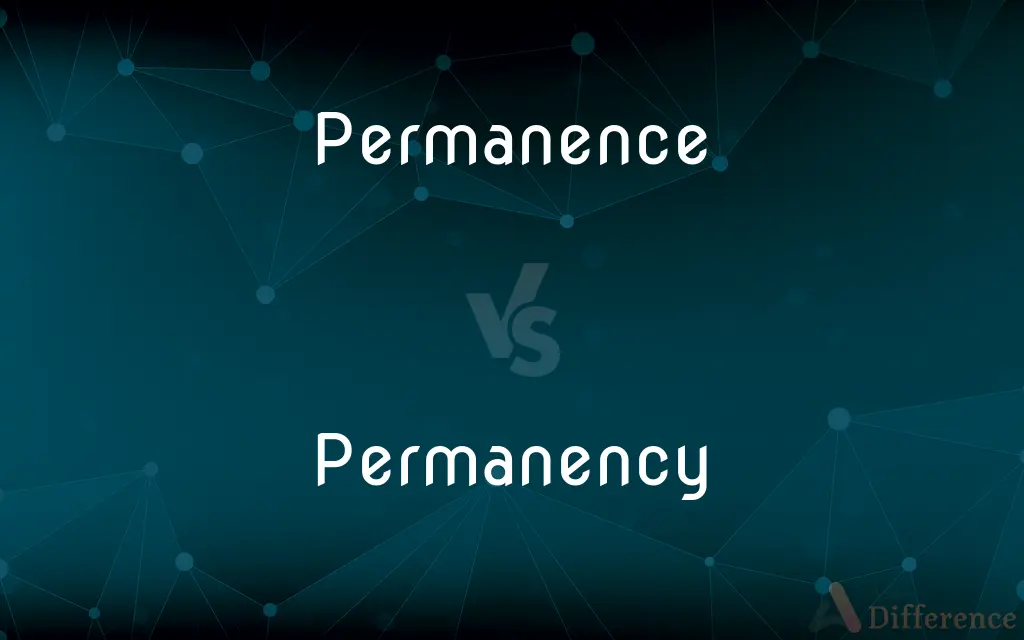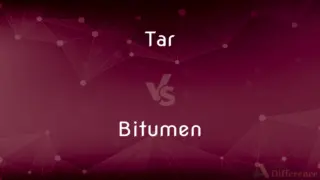Permanence vs. Permanency — What's the Difference?
By Urooj Arif & Fiza Rafique — Updated on March 25, 2024
Permanence refers to the state of lasting indefinitely without change, emphasizing durability and stability, while permanency carries a similar meaning but often implies a legal or formal aspect of being permanent.

Difference Between Permanence and Permanency
Table of Contents
ADVERTISEMENT
Key Differences
Permanence is a concept that denotes the quality or state of something lasting indefinitely, without fundamental or significant change. It suggests a sense of timelessness or durability that transcends temporary states or fleeting moments. On the other hand, permanency, while synonymous with permanence in many respects, carries with it an additional layer of meaning that often relates to formal, legal, or institutional settings.
In discussions about materials or physical objects, permanence might be used to describe the enduring quality of stone compared to the temporary nature of paper in certain conditions. In contrast, permanency could be applied to legal contexts, such as the permanency of a court decision or the permanent status granted in adoption procedures. This subtle distinction highlights how permanency is not only about duration but also about the formal acknowledgment of that state.
Both concepts are essential in fields like environmental science, where permanence refers to the long-lasting impact of certain actions on ecosystems, and in legal frameworks, where permanency can relate to the enduring effects of legislation or legal rulings. While permanence focuses on the inherent characteristic of lasting indefinitely, permanency emphasizes the formal recognition or establishment of a permanent condition.
The significance of permanence in philosophy and art reflects the human desire to create or understand concepts that defy the temporal limitations of life. In contrast, the importance of permanency in social policies, such as housing or child welfare, underscores the need for stable, lasting arrangements that are recognized and protected by societal institutions.
Ultimately, while permanence and permanency are closely related and often used interchangeably, the choice between them can depend on the context and the emphasis on either the intrinsic quality of lasting indefinitely or the formal, often legal, acknowledgment of such a state.
ADVERTISEMENT
Comparison Chart
Definition
The quality of lasting indefinitely without change.
The condition of being permanent, especially in a formal or legal sense.
Context
General use across various fields.
Often used in legal, formal, or institutional contexts.
Emphasis
Durability, timelessness, and stability.
Formal recognition or establishment of a permanent state.
Examples
The permanence of diamond's structure.
The permanency of a legal judgment.
Application
Used to describe physical objects, principles, or natural phenomena.
Used to describe conditions or statuses conferred by laws or agreements.
Compare with Definitions
Permanence
A state or quality of lasting indefinitely without significant change.
The permanence of the mountains inspires awe.
Permanency
A formal declaration of a lasting condition.
The legislation ensured the permanency of the conservation area.
Permanence
The enduring nature of something, resistant to change.
The artist sought to capture the permanence of human emotions.
Permanency
The establishment of a permanent status or arrangement.
Achieving permanency in foster care situations is a complex process.
Permanence
The timeless aspect of certain concepts or values.
The permanence of justice is a foundational principle of law.
Permanency
The condition of being permanent, especially legally or formally.
The permanency of the adoption was a relief to the family.
Permanence
The continuous existence of something.
The river's flow seems to symbolize the permanence of nature itself.
Permanency
A stable or lasting state, recognized by institutions.
The policy aimed to provide permanency in housing for the homeless.
Permanence
Durability or stability over time.
The permanence of these ancient ruins is remarkable.
Permanency
The enduring effect of legal rulings or agreements.
The court's decision granted permanency to the land rights.
Permanence
The quality or condition of being permanent; permanency.
Permanency
Permanence
The permanency of Egypt's great pyramids.
Permanence
The state of being permanent.
Permanency
The state or quality of permanence.
The permanency of the new government is questionable.
Permanence
(physics) The reciprocal of magnetic inductance.
Permanency
(countable) A person or thing permanently in residence.
Permanence
The quality or state of being permanent; continuance in the same state or place; duration; fixedness; as, the permanence of institutions; the permanence of nature.
Permanency
The property of being able to exist for an indefinite duration
Permanence
The property of being able to exist for an indefinite duration
Common Curiosities
What does permanence mean in environmental terms?
In environmental terms, permanence refers to the long-term stability and endurance of ecosystems, conservation efforts, or the impact of human actions on nature.
How does permanency apply to legal contexts?
Permanency in legal contexts involves the establishment of enduring legal statuses, rights, or conditions through formal rulings, legislation, or agreements.
What role does permanency play in social policy?
Permanency plays a crucial role in social policy by providing stable, lasting arrangements in areas like housing, child welfare, and employment, which are recognized and protected by societal institutions for the well-being of individuals.
Why is permanence important in philosophy?
Permanence is important in philosophy as it deals with questions of existence, timelessness, and the enduring nature of concepts, truths, or values beyond the temporal confines of human life.
How does the concept of permanence influence art?
The concept of permanence influences art in the pursuit of creating works that transcend time, capturing timeless beauty, emotions, or ideas that resonate across generations.
Can permanence and permanency be used interchangeably?
While they can be used interchangeably in some contexts due to their similar meanings, choosing one over the other depends on whether the emphasis is on the inherent quality of enduring or the formal acknowledgment of this state.
What challenges are associated with achieving permanency in child welfare?
Challenges include navigating legal complexities, ensuring the child's best interests, and finding stable, supportive environments that provide a sense of security and belonging.
Can technological innovations affect the permanence of information?
Technological innovations can both enhance and challenge the permanence of information, making it easier to store and access indefinitely, but also raising issues of data degradation, obsolescence, and security.
How do environmental scientists assess the permanence of conservation efforts?
Environmental scientists assess the permanence of conservation efforts by evaluating their long-term impact on biodiversity, ecosystem stability, and resilience to climate change and human activities.
Is the permanency of a legal judgment absolute?
While the permanency of a legal judgment is intended to be enduring, legal decisions can sometimes be overturned or modified by higher courts, new legislation, or changing societal norms.
Share Your Discovery

Previous Comparison
Tar vs. Bitumen
Next Comparison
Academic vs. AcademicalAuthor Spotlight
Written by
Urooj ArifUrooj is a skilled content writer at Ask Difference, known for her exceptional ability to simplify complex topics into engaging and informative content. With a passion for research and a flair for clear, concise writing, she consistently delivers articles that resonate with our diverse audience.
Co-written by
Fiza RafiqueFiza Rafique is a skilled content writer at AskDifference.com, where she meticulously refines and enhances written pieces. Drawing from her vast editorial expertise, Fiza ensures clarity, accuracy, and precision in every article. Passionate about language, she continually seeks to elevate the quality of content for readers worldwide.














































